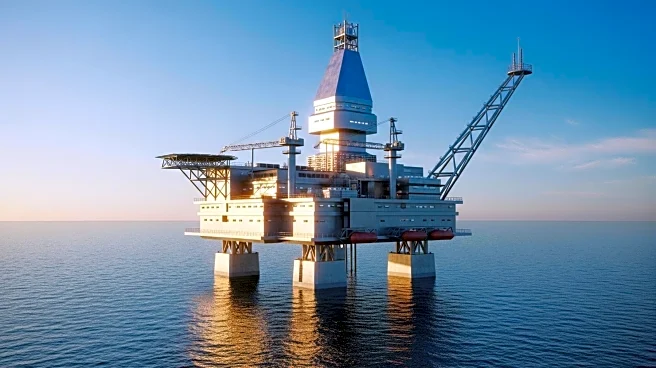What's Happening?
Seatrium has received Approval in Principle (AiP) from the American Bureau of Shipping (ABS) for its innovative FLEXHull 1500K-M floating production storage and offloading (FPSO) design. This approval highlights Seatrium's capability to provide advanced solutions for deepwater oil and gas production. The FLEXHull 1500K-M is engineered to manage topside loads of up to 80,000 metric tons and features a hull adaptable to various requirements. It includes expanded tank capacity, flexible mooring systems with up to 20 points, and is capable of operating in waters as deep as 2,500 meters. The unit can process 120,000 barrels of oil per day, alongside 10 million Sm3/d of gas, and has storage for over 1.5 million barrels of oil. Designed for a 25-year service life, it complies with standards set by the International Maritime Organization (IMO), MARPOL, and ABS. Seatrium intends to deploy the FPSO in challenging offshore environments, including deepwater regions such as offshore Brazil.
Why It's Important?
The approval of Seatrium's FPSO design by ABS is significant for the offshore oil and gas industry, particularly in deepwater exploration and production. This development could enhance the efficiency and safety of oil extraction in challenging environments, potentially increasing production capacity and reducing operational risks. The ability to operate in deepwater regions like offshore Brazil opens new opportunities for oil companies to tap into previously inaccessible reserves, which could lead to increased energy supply and economic benefits. Additionally, the compliance with international standards ensures that environmental and safety regulations are met, which is crucial for sustainable development in the oil and gas sector.
What's Next?
Seatrium's next steps likely involve finalizing the design and construction of the FPSO units, followed by deployment in targeted offshore regions. The company may engage with oil and gas operators to secure contracts for the use of its FPSO units, particularly in deepwater areas where traditional extraction methods are less feasible. Stakeholders in the oil and gas industry, including investors and environmental groups, will be monitoring the deployment and operational success of these units. The approval may also prompt other companies to innovate and seek similar certifications for their technologies, potentially leading to advancements in offshore production capabilities.
Beyond the Headlines
The development of advanced FPSO designs like Seatrium's FLEXHull 1500K-M could have broader implications for the global energy market. As deepwater exploration becomes more viable, it may shift the focus from traditional oil fields to untapped offshore reserves, influencing global oil supply dynamics. This shift could also impact geopolitical relations, as countries with significant offshore reserves may gain increased influence in the energy sector. Furthermore, the emphasis on meeting international standards highlights the industry's commitment to environmental sustainability, which could lead to improved public perception and regulatory support.











